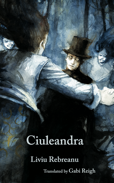Written in the interwar period and published in 1927, this psychological thriller has captured the imagination of Romanian readers ever since. The book begins with a murder, as Puiu, a young aristocrat, strangles his wife on the night of the royal ball. To avoid a public trial and prison sentence, his father arranges to have him committed to a mental asylum.
Puiu’s discussions with his psychiatrist force him to confront his conscience and lead him to trace the root of his murderous passion to a wild, Dyonisian peasant dance called the Ciuleandra, where he first glimpsed his future wife. Unfortunately for Puiu, though, his psychiatrist may have more than a professional interest in the case…
This story of obsessive love paints a fascinating picture of the changes in Romanian society at the beginning of the 20th century. The work echoes the cultural landscapes evoked by Russian writers such as Dostoevsky and Gogol, as moments of high drama and emotional intensity bring to life the complex relationship between a decaying aristocracy and the rural world.
The first chapter of this new translation of Ciuleandra was longlisted for the John Dryden Translation Prize, awarded by the British Comparative Literature Association.
Details
- Pages: xviii + 171
- Trim size: 5″ x 8″ (127mm x 203mm)
- ISBN
Softcover: 978-4-908793-49-3
Ebook: 978-4-908793-50-9 - List Price
Softcover: US$17.00
Ebook: US$5.99 - Cover: Daniele Serra
Reviews
- Ciuleandra is an enjoyable tale, what with its mix of murder, guilt, and obsession — and, above all else, the losing of the self in the moment, in something like the Ciuleandra (or murder …).
—Michael Orthofer, The Complete Review
- Amazon
- Barnes & Noble
- Bookstores and university buyers (contact us directly)
About the author
Liviu Rebreanu (1885–1944) was a member of a group of writers responding to the changes in Romanian society after the First World War. His 1932 novel The Uprising documents the peasant uprising of 1907, highlighting the class divisions in Romanian society and inspiring sympathy for the rural poor. Danse Macabre remains a popular novel in Romania, and the film adaptation was longlisted for the Best Foreign Film Award at the Oscars in 1985.
About the translator
Gabi Reigh was born in Romania and moved to the UK in her teens. She has won the Stephen Spender prize for poetry in translation and is currently engaged in a translation project called ‘Interbellum Series’ focusing on works from the Romanian interwar period. The first titles in this series were Poems of Light by Lucian Blaga and three works by Mihail Sebastian: The Town with Acacia Trees, Women and The Star with No Name.




